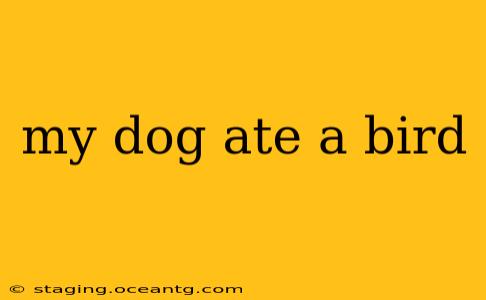Finding out your dog has eaten a bird can be alarming. While some birds present little risk, others pose significant dangers to your canine companion. This guide will help you understand what to do if your dog has consumed a bird, addressing common concerns and offering practical advice. Remember, this information is for guidance only, and you should always consult your veterinarian for personalized advice.
What are the dangers of a dog eating a bird?
The risks associated with a bird being consumed by a dog vary depending on several factors. These include the size of the bird, the size of the dog, and the bird's species.
- Internal parasites: Birds can carry various internal parasites, such as worms and coccidia, which can infect your dog. These parasites can cause a range of health issues, from mild gastrointestinal upset to severe illness.
- Bacterial infections: Some birds may carry bacteria like Salmonella or E. coli, which can lead to food poisoning in dogs. Symptoms can range from vomiting and diarrhea to more serious complications.
- Toxins: Certain bird species may contain toxins in their feathers, flesh, or internal organs. These toxins can be harmful if ingested by your dog.
- Physical obstructions: Bones, feathers, or beaks can cause blockages in your dog's digestive tract, leading to vomiting, constipation, or even requiring surgery.
What should I do if my dog ate a bird?
Your immediate response is crucial. Here's a step-by-step approach:
-
Assess your dog's condition: Check for any signs of distress such as vomiting, diarrhea, lethargy, loss of appetite, or unusual behavior. Note the time your dog consumed the bird.
-
Identify the bird: If possible, try to identify the type of bird your dog ate. Knowing the species can help your veterinarian assess the potential risks. A photo can be helpful.
-
Contact your veterinarian: Don't hesitate to call your vet immediately. They can provide specific advice based on your dog's breed, size, age, and the type of bird consumed. They might recommend inducing vomiting or monitoring your dog closely.
-
Do NOT induce vomiting unless instructed by your vet: While it might seem like a good idea, inducing vomiting without professional guidance can be harmful.
-
Observe your dog closely: Monitor your dog for any changes in behavior or symptoms. Take note of vomiting, diarrhea, lethargy, lack of appetite, or unusual bowel movements.
What if my dog only ate a small part of the bird?
Even a small portion of a bird can still pose risks. While the severity might be reduced, it's still crucial to monitor your dog and contact your veterinarian. They can advise on the necessary precautions.
How long does it take for symptoms to appear after a dog eats a bird?
Symptoms can manifest within a few hours to a few days after ingestion. However, some problems might not become apparent immediately, requiring ongoing monitoring.
Should I be concerned if my dog shows no symptoms?
While the absence of immediate symptoms is reassuring, it's not a guarantee that your dog is completely safe. Some issues may develop later. It's still best to contact your vet, inform them of the situation, and follow their recommendations for monitoring.
Can I prevent my dog from eating birds in the future?
Preventing your dog from consuming birds requires consistent training and management:
- Supervise your dog outdoors: Keep your dog on a leash, especially in areas where birds are present.
- Train your dog: Teach your dog the "leave it" command to prevent it from picking up anything it shouldn't.
- Secure your yard: Make sure your yard is secure, preventing your dog from accessing areas where birds might be.
Remember, your veterinarian is your best resource. Their guidance will ensure your dog receives appropriate care and treatment if necessary. Always seek professional help when your pet ingests something potentially harmful.
